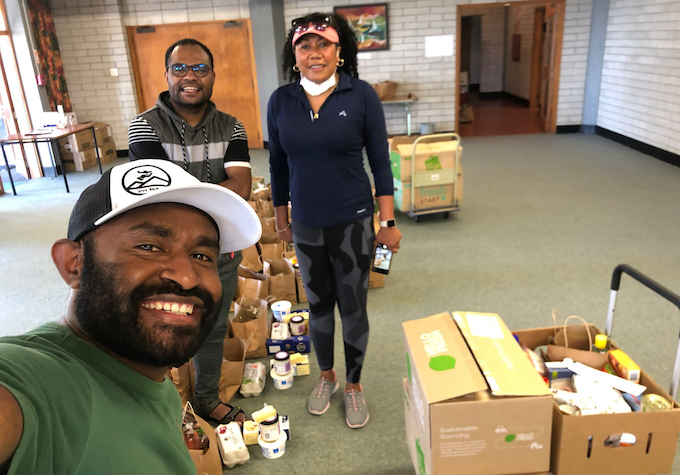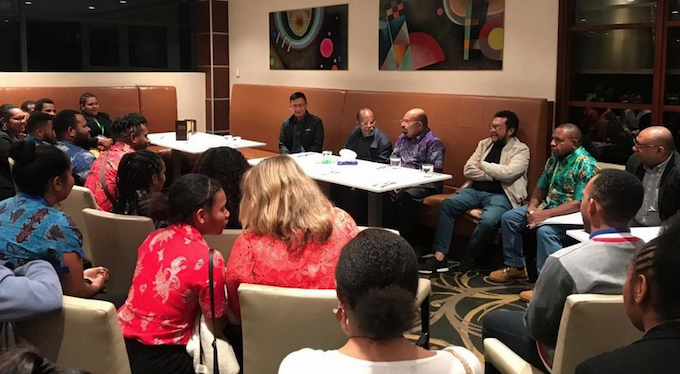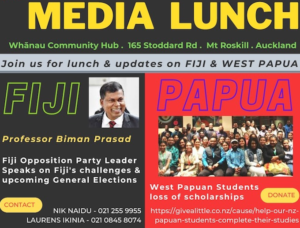OPEN LETTER: By David Robie
Kia ora Immigration Minister Kris Faafoi
It is unconscionable. A bewildering and grossly unfair crisis for 34 young Papuan students – 25 male and 9 female – the hope for the future of the West Papua region, the Melanesian half of Papua New Guinea island ruled by Indonesia.
They were part of a cohort of 93 Papuan students studying in Aotearoa New Zealand on local provincial autonomy government scholarships, preparing for their careers, and learning or improving their English along the way. They were also making Pacific friendships and contacts.
They were fast becoming a “bridge” to New Zealand. Ambassadors for their people.
And then it all changed. Suddenly through no fault of their own, 41 of them were told out of the blue their scholarships were being cancelled and they had to return home.
Their funds were cut with no warning. Many of them had accommodation bills to pay, university fees to cover and other student survival debts.
They were abandoned by their own government, some of them being close to completing their degrees of diplomas. Appeals to both the provincial governments in Papua and the central government in Jakarta – even to President Joko Widodo — were ignored.
Yes, it is unconscionable.
New Zealand help?
Surely New Zealand can respond to this Pacific plea for help?
Asia Pacific Report first published a story about the plight of these students back on January 27. Since then many stories have been written about the students’ struggle to complete their qualifications, including Māori Television, Newsroom, Tagata Pasifika, RNZ Pacific, and Wairarapa Times-Age, and Tabloid Jubi, Cendrawasi Pos and Suara Papua in Papua.
An interview by Laurens Ikinia with Tagata Pasifika last month. Video: Sunpix
They must finish their studies here in New Zealand because returning home to a low wage economy, high unemployment, the ravages of the covid-19 pandemic, and an insurgency war for independence will ruin their education prospects.
Papuan students studying in Australia and New Zealand face tough and stressful challenges apart from the language barrier. As Yamin Kogoya, a Brisbane-based West Papuan commentator, says from first-hand experience:
“Papuan students abroad face many difficulties, including culture shock and adjustments, along with anxiety due to the deaths of their family members back in West Papua, which take a toll on their study.
“As well as inconsistencies and delays in Jakarta’s handling of funds, corruption, harassment, and intimidation also contribute to this crisis.”
At present, out of 17 students currently studying at the Universal College of Learning (UCOL) in Palmerston North, only 10 are able to attend classes. Seven students cannot attend because of their visa status and tuition fees which have not been paid.
Yesterday Teanau Tuiono was interviewed on @TeAo_Official to speak on the scholarship funding cut impacting Western Papuan students in Aotearoa. @teanau_tuiono provides great context for all those wanting to learn about this issue and how to help!https://t.co/P92j1ORrwQ
— Te Mātāwaka (@Te_Matawaka) March 23, 2022
Five students at AUT
At Auckland University of Technology, out of five students studying there, one is doing a masters degree, four are studying for diplomas and one is not enrolled because the government has not paid tuition fees.
Out of the 41 recalled students, the visas for some of them have already expired while others are expiring this month.
Of the 34 students still in New Zealand and determined to complete their studies, the breakdown is understood to be as follows:
UCOL Palmerston North – 15
Institute of the Pacific United (IPU) New Zealand – 6
AUT University – 4
Ardmore Flying School – 2
Waikato University – 2
Canterbury University – 1
Massey University – 1
Unitec – 1
Victoria University – 1
Awatapu College – 1

The students have rallied and are working hard to try to rescue their situation as they are optimistic about completing their studies. The Green Party has taken up advocacy on their behalf.
The Papuans are communicating with the NZ International Students Association, NZ Students Union and NZ Pasifika Students.
Community groups such as the Whānau Hub in Mt Roskill, Auckland, have assisted with food and living funds. A givealittle page has been set up for relief and has raised more than $6500 so far.
But far more is needed, and an urgent extension of their student visas is a must.

‘Grateful for support’
“We’re so grateful to all Kiwis across the country for their generous support for us at our time of desperate need,” says communication coordinator Laurens Ikinia of the International Alliance of Papuan Students Associations Overseas (IAPSAO) and who is a postgraduate student at AUT.
“We’re also grateful to all the tertiary institutions and universities for understanding the plight of the West Papuan students.”
Papuan students are speaking today on the issue at a Pacific “media lunch” in a double billing along with Fiji’s opposition National Federation Party leader Professor Biman Prasad at the Whānau Community Centre in Auckland’s Mt Roskill.

Just last Monday, many worried parents and families of students affected by this sudden change of scholarship policy gathered to meet Papua Governor Lukas Enembe in Jayapura to plead their case.
Hopefully, Indonesian Ambassador Fientje Maritje Suebu, ironically also a Papuan, will read this appeal too. The situation is an embarrassment for Indonesia at a time when the republic is trying to foster a better image with our Pacific neighbours.
Minister Faafoi, surely New Zealand can open its arms and embrace the Papuan students, offering them humanitarian assistance, first through extended visas, and second helping out with their financial plight.
Waaa waaa waaa.
Dr David Robie
Editor
Asia Pacific Report
Article by AsiaPacificReport.nz





